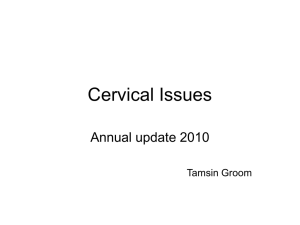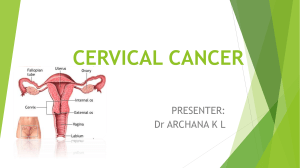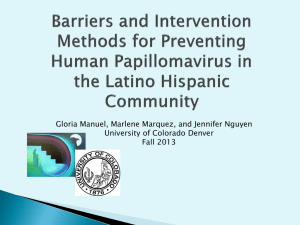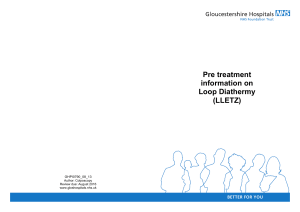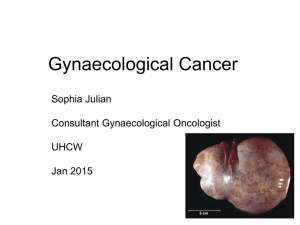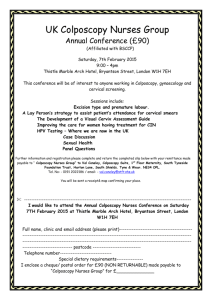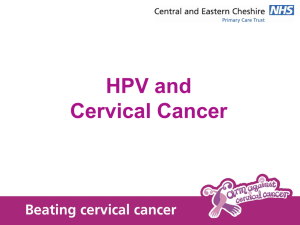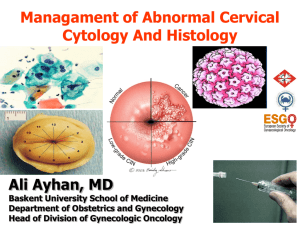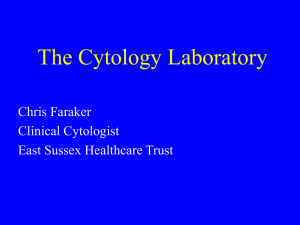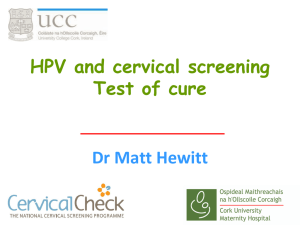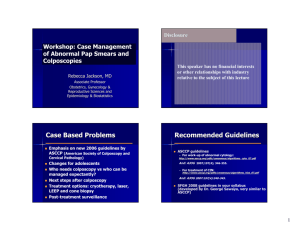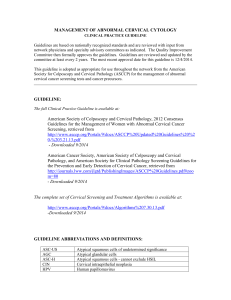colposcopy
advertisement
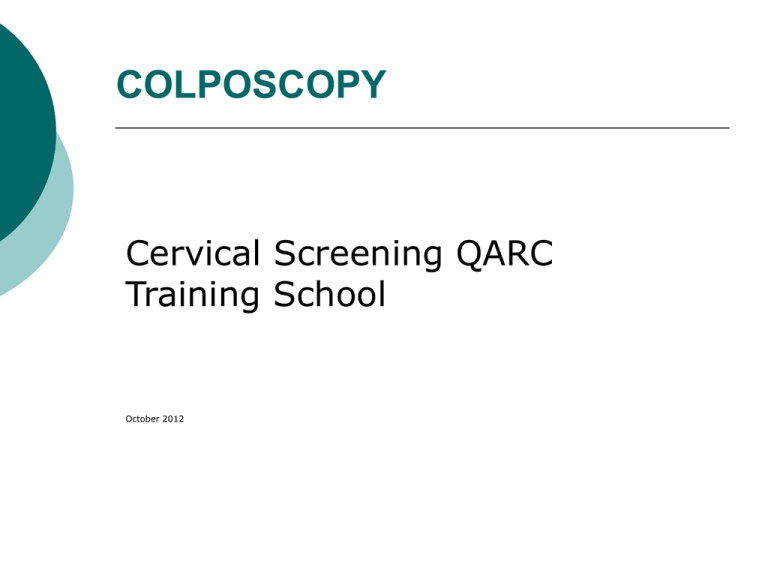
COLPOSCOPY Cervical Screening QARC Training School October 2012 Terminology • Dyskaryosis • Cervical Intraepithelial Neoplasia (CIN) Disease progression Months Time Normal epithelium HPV infection; koilocytosis Borderline CIN I Mild Years CIN II Moderate CIN III Invasive cervical cancer Severe CIN I 57% CIN II 43% CIN III 32% Approx. likelihood of regression Dyskaryosis Indications for Colposcopy • ABNORMAL CYTOLOGY • Moderate or severely dyskaryotic result • Borderline/mild samples that are high risk (16 & 18) HPV positive • Abnormal glandular cells • FINDINGS OR SYMPTOMS • Suspicious appearance to cervix • Symptomatology – post coital bleeding Examination • • • • • • Cusco Speculum ??repeat LBC sample Acetic Acid +/- Lugols Iodine Colposcope Punch Biopsy Silver nitrate Treatment • Excisional – LETZ, Knife Cone • Destructive - Cold Coag, Laser Ablation • Rarely - Hysterectomy Follow-Up prior to HPV testing • After Treatment for high grade CIN (or worse) – Cervical sampling 6, 12 then annually for 10 years • After Treatment for low grade CIN – 6, 12, 24 then normal recall • After hysterectomy (if no Cervix) – no longer part of re-call! Gynaecologist sets intervals What is HPV test of cure? • Women who have a normal, borderline or mild cervical screening result six months after treatment for CIN and who also test negative for high-risk HPV have a very low risk of residual disease. • Samples taken six months post treatment that are cytology negative are HPV tested. • Women whose samples show no high-risk HPV will proceed to three year routine recall – avoiding the need for up to 10 years of annual cervical screening. • Women who have an abnormal cervical screening result or whose samples show high-risk HPV six months after treatment will be referred back to colposcopy. Question 1 Question 2 Question 3 Question 4 Question 5 Question 6 Question 7 Question 8 Question 9 Letz and pregnancy • Knife cone worse than Letz • Laser ablation carries no risk • Complications • Premature labour (<37/40) 1.7 RR • Premature rupture of membranes 2.7 RR • Low birthweight 1.8 RR • Cervical stenosis – emergency LSCS Colposcopy in Pregnancy • Aim is to exclude invasive disease • No evidence of more rapid progression in pregnancy • Avoid treatment but can biopsy • Warts more florid • Sampling and colposcopy are easily interpreted despite pregnancy changes • If has invasive disease when pregnant • Treat Ca cx if under 24/40 i.e. terminate pregnancy. After 24/40 deliver by LSCS as soon as baby is viable (32/40) Colposcopy after the menopause • Transformation zone is usually not visible • With low grade cytology try to repeat ‘sample’ after a course of topical oestrogen Cervical Dysplasia • Oncogenic virus is the cause of over 99% of cases • Co-factors • Smoking • Parity • Immunocompromise (Transplants & HIV) HPV triage as an adjunct to LBC & Colposcopy • LBC allows HPV testing • No value in the assessment of women with high grade dyskaryosis – assumption is that they are all HPV +ve • In women with borderline and mild dyskaryosis may allow decision about who needs colposcopy • Follow up after treatment for CIN
